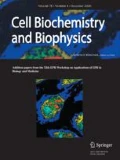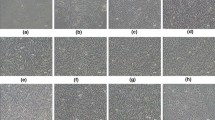Abstract
Amniotic fluid-derived mesenchymal stem cells (AF-MSC) are newly described, excellent seed cells that have good differentiation capability and are convenient to obtain. However, it is important to develop a method to isolate and culture AF-MSC efficiently. Amniotic fluid samples were obtained from rabbits and the adherence method was used for AF-MSC culture. Flow cytometry, western blot, and immunofluorescence studies were used to analyze the phenotypic characteristics of the cultured AF-MSC. Amniotic fluid-derived mesenchymal stem cells were successfully isolated and cultured from amniotic fluid. Flow cytometric analysis demonstrated that these cells expressed CD29 and CD44, while they did not express CD34. The expression of transcription factor Oct-4 was confirmed by western blot and immunofluorescence analysis. Using the adherence method, we developed a successful, reproducible protocol for the isolation of AF-MSC from amniotic fluid. The results of our phenotypic analysis revealed that the AF-MSC isolated in the present study were multipotent cells.




Similar content being viewed by others
References
Delo, D. M., Guan, X., Wang, Z., et al. (2011). Calcification after myocardial infarction is independent of amniotic fluid stem cell injection. Cardiovascular Pathology, 20, e69–e78.
Decembrini, S., Cananzi, M., Gualdoni, S., et al. (2011). Comparative analysis of the retinal potential of embryonic stem cells and amniotic fluid-derived stem cells. Stem Cells and Development, 20, 851–863.
Antonucci, I., Stuppia, L., Kaneko, Y., et al. (2011). Amniotic fluid as a rich source of mesenchymal stromal cells for transplantation therapy. Cell Transplantation, 20, 789–795.
Shaw, S. W., Bollini, S., Nader, K. A., et al. (2011). Autologous transplantation of amniotic fluid-derived mesenchymal stem cells into sheep fetuses. Cell Transplantation, 20, 1015–1031.
Lovati, A. B., Corradetti, B., Lange Consiglio, A., et al. (2011). Comparison of equine bone marrow-, umbilical cord matrix and amniotic fluid-derived progenitor cells. Veterinary Research Communications, 35, 103–121.
Yadav, P. S., Mann, A., Singh, V., et al. (2011). Expression of pluripotency genes in buffalo (Bubalus bubalis) amniotic fluid cells. Reproduction in Domestic Animals, 46, 705–711.
Sessarego, N., Parodi, A., Podesta, M., et al. (2008). Multipotent mesenchymal stromal cells from amniotic fluid: Solid perspectives for clinical application. Haematologica, 93, 339–346.
Sun, L., Tan, Y., Wang, H., et al. (2003). Cloning culture of the marrow mesenchymal stem cells and their differentiation towards cardiomyocytes. Fudan University Journal of Medical Sciences, 30, 519–522.
Gilbert, P. M., Corbel, S., Doyonnas, R., et al. (2012). A single cell bioengineering approach to elucidate mechanisms of adult stem cell self-renewal. Integrative Biology (Camb), 4, 360–367.
Prusa, A. R., & Hengstschlager, M. (2002). Amniotic fluid cells and human stem cell research: A new connection. Medical Science Monitor, 8, RA253–RA257.
Kaviani, A., Perry, T. E., Dzakovic, A., et al. (2001). The amniotic fluid as a source of cells for fetal tissue engineering. Journal of Pediatric Surgery, 36, 1662–1665.
Klein, J. D., & Fauza, D. O. (2011). Amniotic and placental mesenchymal stem cell isolation and culture. Methods in Molecular Biology, 698, 75–88.
Bajada, S., Mazakova, I., Richardson, J. B., et al. (2008). Updates on stem cells and their applications in regenerative medicine. Journal of Regenerative Medicine & Tissue Engineering, 2, 169–183.
Rodrigues, M. T., Lee, S. J., Gomes, M. E., et al. (2012). Amniotic fluid-derived stem cells as a cell source for bone tissue engineering. Tissue Engineering Part A, 18, 2518–2527.
Shaw, S. W., David, A. L., & De Coppi, P. (2011). Clinical applications of prenatal and postnatal therapy using stem cells retrieved from amniotic fluid. Current Opinion in Obstetrics and Gynecology, 23, 109–116.
Tsai, M. S., Lee, J. L., Chang, Y. J., et al. (2004). Isolation of human multipotent mesenchymal stem cells from second-trimester amniotic fluid using a novel two-stage culture protocol. Human Reproduction, 19, 1450–1456.
In ‘t Anker, P. S., Scherjon, S. A., Kleijburg-van der Keur, C., et al. (2003). Amniotic fluid as a novel source of mesenchymal stem cells for therapeutic transplantation. Blood, 102, 1548–1549.
De Coppi, P., Bartsch, G, Jr, Siddiqui, M. M., et al. (2007). Isolation of amniotic stem cell lines with potential for therapy. Nature Biotechnology, 25, 100–106.
Phermthai, T., Odglun, Y., Julavijitphong, S., et al. (2010). A novel method to derive amniotic fluid stem cells for therapeutic purposes. BMC Cell Biology, 11, 79.
Kobayashi, T., Fujisawa, A., Amagai, M., et al. (2011). Molecular biological and immunohistological characterization of canine dermal papilla cells and the evaluation of culture conditions. Veterinary Dermatology, 22, 414–422.
Sikkema-Raddatz, B., van Echten, J., van der Vlag, J., et al. (2002). Minimal volume of amniotic fluid for reliable prenatal cytogenetic diagnosis. Prenatal Diagnosis, 22, 164–165.
Antonucci, I., Pantalone, A., Tete, S., et al. (2012). Amniotic fluid stem cells: A promising therapeutic resource for cell-based regenerative therapy. Current Pharmaceutical Design, 18, 1846–1863.
Mauro, A., Turriani, M., Ioannoni, A., et al. (2010). Isolation, characterization, and in vitro differentiation of ovine amniotic stem cells. Veterinary Research Communications, 34(Suppl 1), S25–S28.
Bossolasco, P., Montemurro, T., Cova, L., et al. (2006). Molecular and phenotypic characterization of human amniotic fluid cells and their differentiation potential. Cell Research, 16, 329–336.
Kim, J., Lee, Y., Kim, H., et al. (2007). Human amniotic fluid-derived stem cells have characteristics of multipotent stem cells. Cell Proliferation, 40, 75–90.
Acknowledgments
This work was supported by Nature Science Foundation of China Grant 81170124/H0203.
Author information
Authors and Affiliations
Corresponding authors
Additional information
Shan Jiang: Co-first author.
Rights and permissions
About this article
Cite this article
Fei, X., Jiang, S., Zhang, S. et al. Isolation, Culture, and Identification of Amniotic Fluid-Derived Mesenchymal Stem Cells. Cell Biochem Biophys 67, 689–694 (2013). https://doi.org/10.1007/s12013-013-9558-z
Published:
Issue Date:
DOI: https://doi.org/10.1007/s12013-013-9558-z




